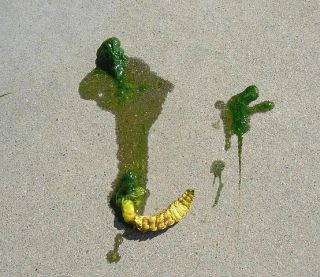Sex
Having a Crush on Insects
Understanding a Sexual Fetish—and its Ethical Implications
Posted September 18, 2015

Disgusting, sexy--or both?
I must look like a tiny, squirmy silverfish or an oversized white worm or maggot… “Look, there on the floor, you guys, it’s my boyfriend. I know it looks like a strange insect but it’s him.” [a friend makes to fetch a tissue] “Why bother,” says Rei. “Let’s just step on him!"
In this passage from the American Journal of the Crush-Freaks, the author imagines himself insect-sized and his sexual fantasy culminates in being ground into the carpet. The paraphilia of crush fetishism involves the desire to be squashed by a woman. Although being trampled to death by a powerful femme fatale would be the epitome of fulfillment, dying is a high price to pay for great sex. So, the crush fetishist substitutes another living organism, watches it be crushed (typically with high heels or bare feet), and fantasizes about being the repulsive, vulnerable victim. The fetish has been anecdotally traced to a childhood experience of seeing one’s mother crushing an insect, which becomes seared into the psyche of the boy (only males exhibit this paraphilia).
Until the early 1990s, few people were aware that some men derived sexual satisfaction from watching creatures being crushed by women. A series of films produced by Jeff Vilencia put this paraphilia on the social and political radar. The plot conventions mirrored those of low-budget porn: an ordinary setting in which a woman encounters the fetishist, followed by a large sheet of white paper on which is scattered worms and insects, and then a bit of contrived dialogue with lots of crushing, including graphic close-ups (e.g., a cricket’s head protruding from beneath a shoe).
Valencia’s films were produced for the ‘soft crush’ folks who are satisfied by invertebrates (worms, snails, crickets, grasshoppers). The far less common ‘hard crush’ sorts opt for vertebrates (mice, guinea pigs, and kittens). However, even soft-core crush videos were sufficient to raise the ire of the public—and politicians.
When people learned of this paraphilia, the outrage led to congressional hearings in which opponents testified—without offering evidence—that crushing insects was a ‘gateway fetish’ leading to spousal abuse, school shootings, and even the crushing of children. House Resolution 1887 sailed through Congress. In a nod to the First Amendment, Bill Clinton signed it with the caveat that the Justice Department apply it only to “wanton cruelty to animals designed to appeal to a prurient interest in sex.”
Throughout the hearings, Vilencia was a remarkably articulate advocate for his fellow fetishists. As a vegan and animal rights advocate, he argued that society was profoundly hypocritical. Why was it acceptable to raise sentient mammals in the appalling misery of factory farms to satisfy a desire to eat flesh, but it was immoral to squash insects to satisfy sexual desires? Crushing a handful of worms versus confining thousands of a pigs? If there’s anything more complicated than the infested mind, it is surely the philosophical mind.


